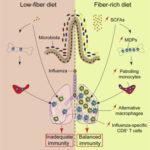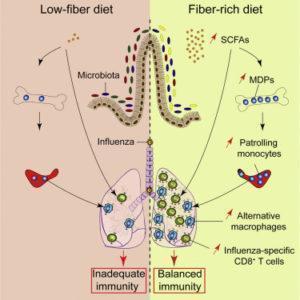Dietary fibre, particularly products of bacterial fermentation of dietary fibre such as short chain fatty acids (SCFAs) acetate, butyrate and propionate have been shown to have anti-inflammatory properties. A recent study of airway inflammation in mice demonstrated a protective effect of SCFAs derived from a high fibre diet. This effect was primarily mediated by SCFAs binding to G protein coupled receptors FFAR3 (GPR41), which resulted in poor presentation of antigen by dendritic cells to T cells, leading to reduced Th2 responses.
Studies have clearly demonstrated that SCFAs induce anti-inflammatory responses which result in alleviation of chronic inflammation. However, there is limited knowledge on the effect of SCFAs during infection. A study conducted by Trompette et al., aimed to determine the effects of dietary fibre and SCFAs in a murine model of influenza infection.
Researchers demonstrated that supplementing the diet with inulin (high fibre), resulted in protection against influenza-induced lung damange and decreased mortality. Reduced influenza pathology and disease severity was specifically attributed to increased levels of the SCFA, butyrate, in mice fed with inulin compared to controls.
Trompette et al., showed that SCFAs altered bone marrow hematopoiesis resulting in increased proportions alternatively activated monocytes (AAMs) derived from Ly6c- monocytes. AAMs release less CXCL1, neutrophil chemoattractant, resulting in reduction in neutrophil lung infiltration and ultimately causing less tissue damage. Immuno-modulation by SCFAs was not limited to innate immunity, Trompette et al., also demonstrated that high dietary fibre and butyrate also enhance CD8 T cells responses. SCFAs specifically increased glycolytic capacity of CD8 T cells, resulting in activated CD8 T cells with increased tissue homing capacity and increased cytotoxic ability.
This study clearly demonstrates that dietary fibre and SCFAs reduce influenza-associated disease severity by promoting differentiation of AAMs and enhancing CD8 T cells effector functions. Whether these responses are sustained after cessation of high fibre supplementation is yet to be determined.
Journal Article: Trompette et al., (2018). Dietary Fiber Confers Protection against Flu by Shaping Ly6c– Patrolling Monocyte Hematopoiesis and CD8+ T Cell Metabolism. Immunity
Article by Cheleka AM Mpande

